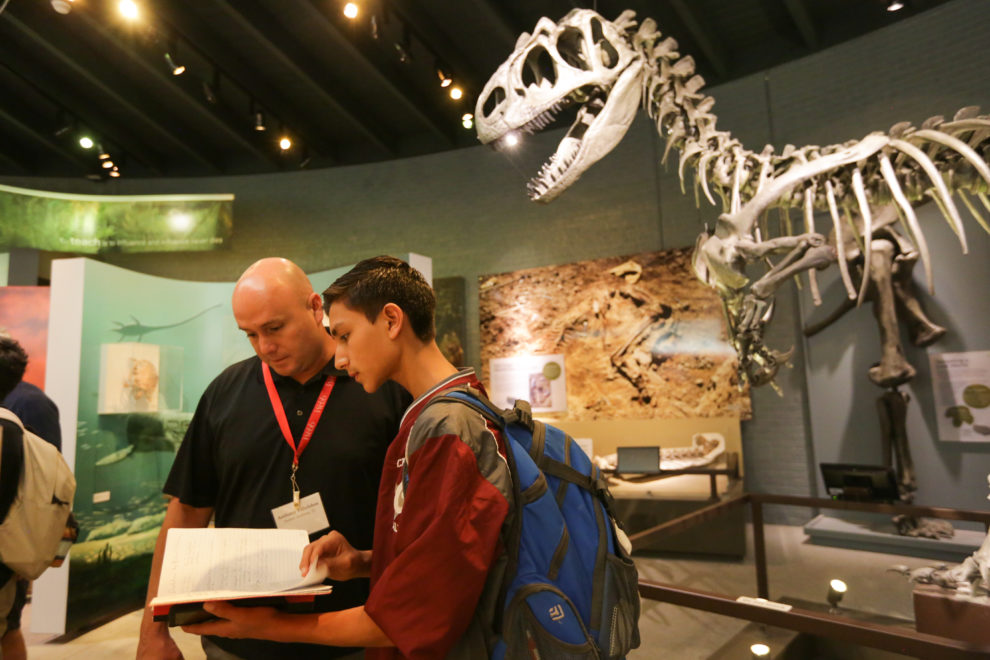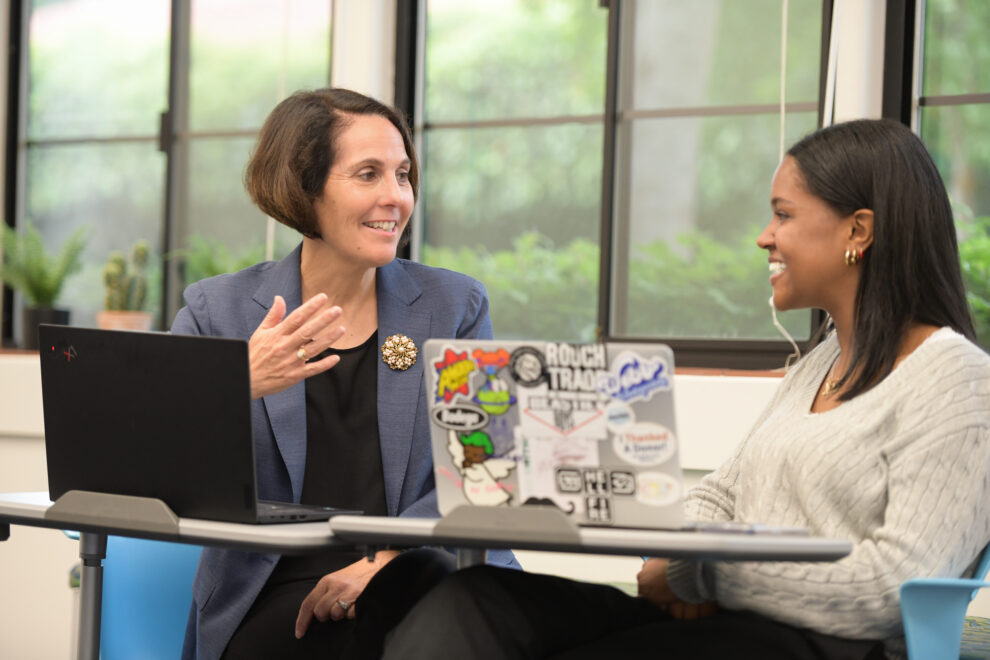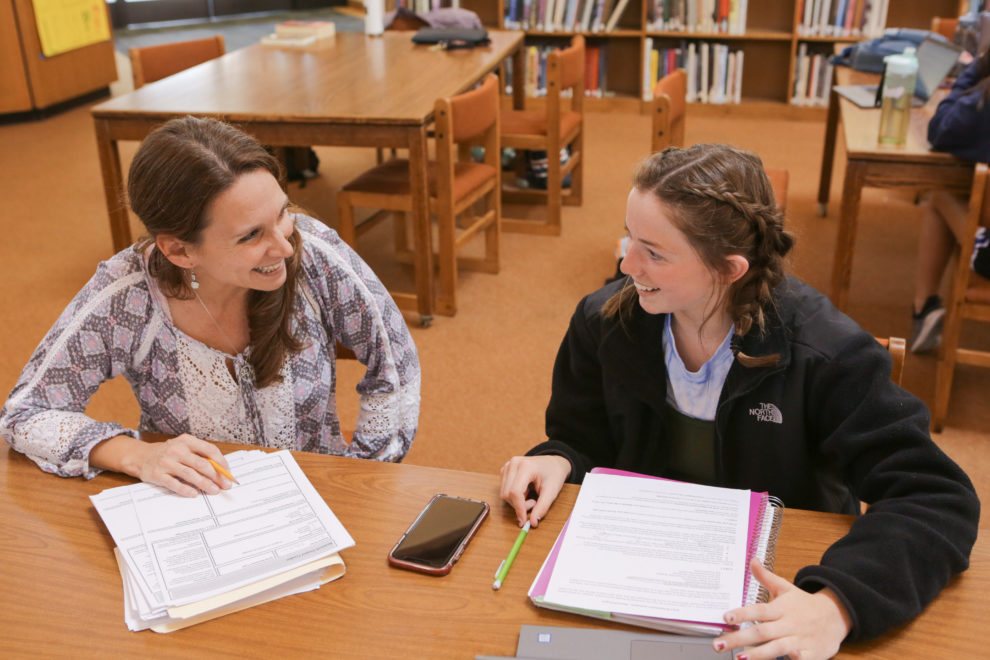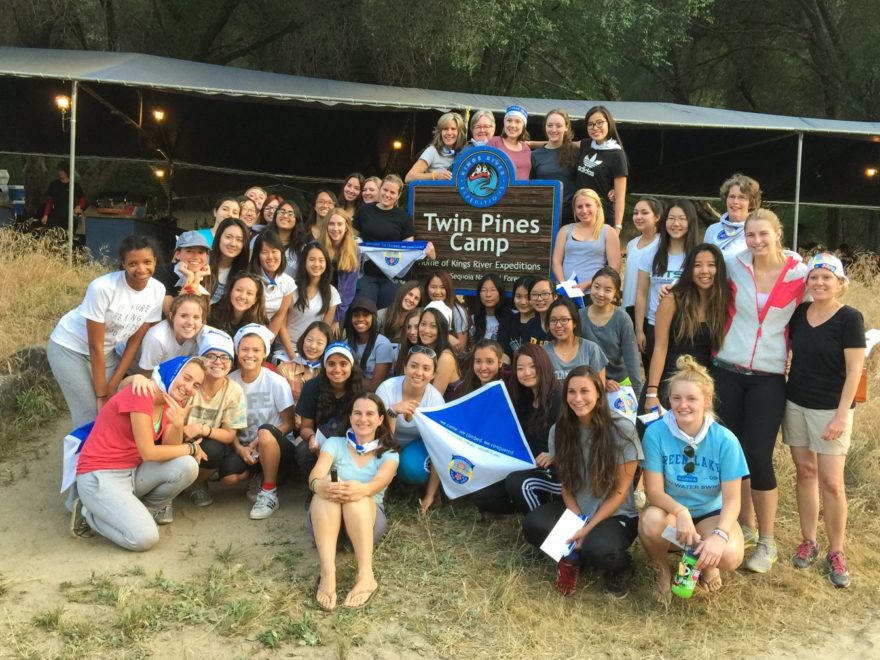A guide at hand
Advisory Program
Our advisory program is wide and deep, centered on academic and personal development and built on the knowledge that we are at our best when we are known, seen, supported and valued. While all students will come to know many members of the faculty and staff on an informal basis, each student has a faculty advisor who is there to listen and to guide them on their Webb journey. Advisory groups of six to eight students see each other daily – at chapel, class meetings, assembly and in designated advisory meetings. They meet for advising dinners and enjoy other fun outings together. Students and advisory groups develop constructive, trusting relationships and these groups become centers of mutual support, interest and activity.
Advisors empower students to set goals, embrace feedback and celebrate their successes as they navigate the journey from freshmen to graduates. The advisory program is rooted in four mission-aligned pillars that help students self-advocate, build healthy relationships, understand themselves as learners and contribute to and draw strength from our community.
The advisor is the faculty member who is most familiar with a student’s progress, concerns and needs and is the primary contact between a parent and the school. The responsibilities of an advisor include supervising the student’s academic progress, representing the student in faculty discussions, advising the student on personal or social questions or problems, discussing disciplinary situations if ever necessary and communicating with parents periodically throughout the year.
9th Grade
Our goal here is to learn how to navigate Webb. We also work on Webb’s core values and how to embody them.
First-year students transition to high school and begin to build their identities as teenagers. Webb is an institution with a very particular culture, approach to learning and value system that students must learn and both day and boarding students need to adjust to a residential learning community.
Our goal here is for students to identify how they can, should and might do their best work and feel a sense of self-worth and empowerment. Skills include self-identity, accessing support and mentorship, and setting individual goals.
First year students need to initially learn the system: what the supports are and how to access them. They require modeling of self-advocacy skills and these, along with self-assessment skills, can be built into advisory discussions. Advisors closely guide students as they learn to access the system, keeping aware of common first year struggles. Dorm life, academic progress, social and interpersonal relationships and conflict resolution are all opportunities for students to self-assess and learn advocacy skills.
Our goal here is to promote a sense of identity and belonging, and the desire to maintain, enrich, and promote that experience within the community.
During their first year, themes of disconnection and reconnection frame students’ experiences. The departure from the family unit while adjusting to a new community of support, mentoring and social connections is the first task that most students will focus on. Of particular focus is ensuring students understand the model of adult/student relationships at Webb, in particular the role of advisors, dorm heads and other various adults is just as important as a student’s need to connect with a peer group. In addition, student and advisor relationships with parents are often centered on describing/explaining community norms as the focal point of support shifts to Webb.
Our goal here is the creation and nurturing of empathy and mindfulness in decision making.
During their first year, students’ energy is focused on peer struggles, living together, learning to understand how others may experience life, how to talk to others, boundaries in relationships, how to treat others, respecting others, living with a roommate and communicating with others, in particular in times of conflict. Learning to share and understand others’ values is encouraged and explored. Students need guidance in expressing their thoughts and reflecting on what impact their behavior or interactions have in the community.

10th Grade
By their second year, students should have learned Webb’s expectations, systems and values. As sophomores, they practice and expand on these skills by applying them to new challenges: more demanding classes, time management, new roles in activities and campus life and shifting friend groups. Sophomores new to Webb are provided the support and attention they need as students just joining our community and returning sophomores continue to build on lessons learned during their first year.
Students in this year are practicing (failing and succeeding) the skills they have begun to develop in their first year. Advisors stand alongside students as they practice these skills, continuously monitoring and supporting self-assessment and self-advocacy skills. The developmental shift within this year is significant, and as such some students will require more active involvement than others. In general, students should end the year better able to self-evaluate with less comparative values placed on their peers’ experiences.
Interpersonal relationships shift this year as students have a better sense of self. For VWS, changing to a new advisor helps students broaden their support and connection on campus. Connections with teachers are more natural for students that have been here one year and new students need this year to understand this community norm. Social dynamics shift this year, and both VWS and WSC students begin to have more interactions. Students continue to build and deepen relationships with teachers, becoming more comfortable with seeking support and guidance from faculty and peers in the Webb community.
The second year is a natural extension of first-year skills. Better self-awareness and an increased ability to articulate personal values helps students to better understand their impact on the community. Advisors may need to support students by modeling ways to discuss individual ideals, as students are practicing these skills in every area of their life.

11th Grade
Juniors take on formal, titled roles as leaders and a more demanding course load of advanced classes. Even juniors who do not have titled roles as leaders are expected to practice leadership roles in their interactions with their peers, with younger students and with adults. They are learning what that role is at the same time that they are doing it. In many departments, junior classes bring together VWS and WSC students for the first time. Students practice community building again, at a time when they are more conditioned to question and seek autonomy and at a time when they should be the most comfortable with their place in the school. Juniors have a higher ability to communicate with adults in a way that is regular and independent. Juniors start to set the tone of the place and become agents in community building.
Students in their third year are working to put self-assessment and advocacy skills into place without regular advisor or teacher prompting or guidance. Students develop a stronger sense of self at the same time that they experience a more challenging social and academic world. Advisors should look to identify students who require additional skill building in this area and help all students reevaluate themselves given the added pressure of external comparisons or standards, in particular at the start of the college process.
During their junior year, connections with adults should become more natural. The transition to a completely co-ed learning environment shifts the community dynamic and may change a students’ standing in class. Students’ relationships within the class changes as VWS and WSC students begin to see their identity as a full class rather than two separate classes. Students have begun to develop a more complex understanding of their families and may begin to reconnect (and feel the upcoming sadness of departing for college) as the end of the year approaches.
Students in their third year are taking on more challenging academic conversations, exploring their individual choice more frequently, and beginning to explore personal choice on a regular basis. Societal conflicts (race/class/gender etc.) come up in many classes and provide opportunities for having difficult conversations and understanding others. Within peer groups, cliques and friendship groups tend to come back together or tie more tightly, making these conversations both easier and more challenging for individual students.

12th Grade
Seniors are leaders and mentors in all spaces in which they engage with other students. They are expected to demonstrate a mastery and appreciation of Webb values, though part of that can involve challenging and questioning those values. Seniors should communicate Webb values to younger students in a healthy way. However, seniors still face upheaval. They feel like they should be comfortable and stable, but new challenges always come up – a new coach, a new teacher, a new rule. Seniors are also preparing to graduate, and they should begin to see that the values and skills they have practiced are meant to help them prepare for their exit. Seniors should celebrate their time and their accomplishments and finish the commitments they made to themselves as Webb students. However, seniors and the wider Webb community should recognize and support that they will start separating themselves from the community and recognize that individualization and disengagement may be a natural part of that process.
Our goal here is to help students refine how they can, should and might do their best work and feel a sense of self-worth and empowerment as a result. Skills include self-identity, accessing support and mentorship and setting individual goals.
As students prepare to depart Webb, they are also beginning to understand the power of networking and connections in a broader sense. As pillars of the community, students teach others to use the community as a support and become the models/mentors for younger students. Learning to express their needs to parents – nurturing the relationship while practicing self-advocacy learned to this point – becomes a vital part of the college process. In addition, as students begin to say goodbye, they may begin to question the community values in order to more easily leave.
As seniors, students are naturally sharing their experience with younger students and with each other. Many of our traditions are centered on seniors who now lead them, rather than watch them. Advisors can support students by making space for reflection and voice as this supports the passing on of traditions and further cements connections with others.

